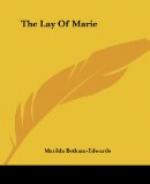Mary must be regarded as the Sappho of her age; she made so considerable a figure amongst the Anglo Norman Trouveurs, that she may very fairly lay claim to the minutest investigation of whatever concerns her memory. She informs us that she was born in France, but has neither mentioned the province that gave her birth, her family name, nor the reasons of her going to England. As she appears, however, to have resided in that country at the commencement of the 13th century, we may reasonably conclude that she was a native of Normandy. Philip Augustus having made himself master of that province in 1204, many Norman families, whether from regard to affinity, from motive of adventure, or from attachment to the English government, went over to Great Britain, and there established themselves. If this opinion be not adopted, it will be impossible to fix upon any other province of France under the dominion of the English, as her birth-place, because her language is neither that of Gascony, nor of Poitou, &c. She appears, however, to have been acquainted with the Bas-Breton, or Armoric tongue; whence it may be inferred that she was born in Bretayne. The Duke of that province was then Earl of Richmond in England; many of his subjects were in possession of knight’s fees in that honour, and Mary might have belonged to one of these families. She was, besides, extremely well versed in the literature of this province; and we shall have occasion to remark, that she frequently borrowed much from the works of its writers in the composition of her own. If, however, a preference should be given to the first opinion, we must suppose that Mary got her knowledge, both of the Armoric and English languages, in Great Britain. She was, at the same time, equally mistress of the Latin; and from her application to three several languages, we must take it for granted that she possessed a readiness, a capacity, and even a certain rank in life, that afforded time and means to attain them. It should seem that she was solicitous to be personally known only at the time she lived in. Hence we find in her works those general denominations, those vague expressions, which discourage the curious antiquary, or compel him to enter into dry and laborious discussions, the result of which, often turns out to be little more than conjecture. In short, the silence or the modesty of this lady, has contributed, in a great degree, to conceal from us the names of those illustrious persons whose patronage her talents obtained.
The first poems of Mary are a collection of Lays, in French verse; forming various histories and gallant adventures of our valiant knights: and, according to the usage of those times, they are generally remarkable for some singular, and often marvellous catastrophe. These Lays are in the British Museum, among the Harleian MSS. No. 978. They constitute the largest, and, at the same time, most ancient specimen of Anglo-Norman poetry, of this kind, that has been handed down to




